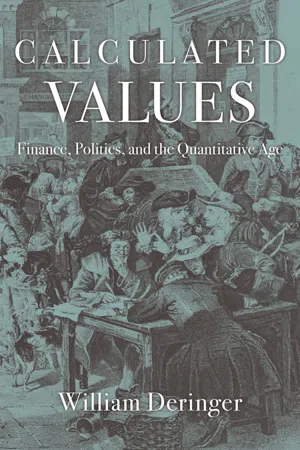
- English
- PDF
- Available on iOS & Android
About This Book
Modern political culture features a deep-seated faith in the power of numbers to find answers, settle disputes, and explain how the world works. Whether evaluating economic trends, measuring the success of institutions, or divining public opinion, we are told that numbers don't lie. But numbers have not always been so revered. Calculated Values traces how numbers first gained widespread public authority in one nation, Great Britain.Into the seventeenth century, numerical reasoning bore no special weight in political life. Complex calculations were often regarded with suspicion, seen as the narrow province of navigators, bookkeepers, and astrologers, not gentlemen. This changed in the decades following the Glorious Revolution of 1688. Though Britons' new quantitative enthusiasm coincided with major advances in natural science, financial capitalism, and the power of the British state, it was no automatic consequence of those developments, William Deringer argues. Rather, it was a product of politics—ugly, antagonistic, partisan politics. From parliamentary debates to cheap pamphlets, disputes over taxes, trade, and national debt were increasingly conducted through calculations. Some of the era's most pivotal political moments, like the 1707 Union of England and Scotland and the 1720 South Sea Bubble, turned upon calculative conflicts.As Britons learned to fight by the numbers, they came to believe, as one calculator wrote in 1727, that "facts and figures are the most stubborn evidences." Yet the authority of numbers arose not from efforts to find objective truths that transcended politics, but from the turmoil of politics itself.
Frequently asked questions
Information
Table of contents
- Cover
- Title Page
- Copyright
- Dedication
- Contents
- Preface: Quantification and Its Discontents
- Notes on Style
- Introduction: Political Calculations
- 1. Finding the Money: Public Accounting and Political Arithmetic after 1688
- 2. The Great Project of the Equivalent: A Story of the Number 398,085½
- 3. The Balance-of-Trade Battle and the Party Politics of Calculation in 1713–1714
- 4. The Preeminent Bookkeepers in Christendom: Personalities of Calculation
- 5. Intrinsic Values: Figuring Out the South Sea Bubble
- 6. Futures Projected: Robert Walpole’s Political Calculations
- 7. Figures, Which They Thought Could Not Lie: The Problem with Calculation in the Eighteenth Century
- Conclusion
- Archival Collections Cited
- Notes on Printed Sources
- Abbreviations
- Notes
- Acknowledgments
- Index